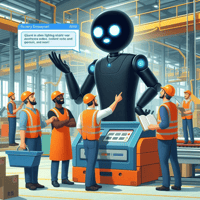Virtual assistants are AI software agents that assist computer systems by responding to requests...
Revolutionizing with AI in Customer Support
In the dynamic world of customer service, where real-time interactions, problem-solving, and effective communication skills are paramount, artificial intelligence (AI) is making significant strides. The integration of AI in customer support is reshaping the way customer service representatives (CSRs) and sales teams interact with customers.
This article explores the various ways in which customer service representatives are leveraging AI to enhance customer experiences, streamline sales processes, and revolutionize the customer support landscape.
Foundations of AI in Customer Support
In the world of customer service, AI is like a helpful sidekick, boosting both customer satisfaction and sales team effectiveness. Proactive customer support is a game-changer, and AI plays a pivotal role. The use of AI in customer support means that support teams can shift from reactive to proactive strategies. AI-powered chatbots, equipped with generative AI, can anticipate customer queries in real-time and offer solutions before customers even ask.
Live chat, backed by AI, adds a dynamic element to customer interactions. Support agents armed with AI tools can find answers swiftly, improving the overall customer service experience. The proactive nature of AI allows customer service teams to intervene in the customer journey, addressing concerns before they escalate. This not only supports customers more effectively but also helps in upselling products or services based on the customer's needs.
The benefits of proactive customer service go beyond immediate issue resolution. By leveraging AI to anticipate customer needs, companies can build a more supported customer base. With AI's ability to analyze data and predict trends, support teams can stay one step ahead, creating a smoother customer experience. As we delve deeper into the age of AI in customer support, the foundations laid by proactive strategies prove to be key in unlocking the full potential of improved customer service and empowered sales teams.
The Reactive Phase: AI’s Initial Role
In the ever-evolving landscape of customer service, AI has stepped into the limelight with its ability to transform the support landscape. Initially, AI's role is often reactive, responding to customer queries and issues in real-time. This is especially evident in the integration of AI-powered chatbots into the customer service experience. These chatbots, fueled by generative AI, efficiently handle routine inquiries, freeing up human support agents to tackle more complex issues.
One of the key advantages is the speed at which AI responds to customer questions. Live chat functionalities allow for immediate assistance, ensuring that customers find answers promptly. This shift towards a more reactive customer service approach improves the overall customer service experience, as support agents can focus on providing personalized solutions rather than spending time on routine tasks. The use of AI in this phase is like a supportive ally, helping customer service teams become more efficient and responsive.
As AI continues to evolve, this reactive phase is just the beginning. The next frontier lies in proactive customer support, where AI anticipates customer needs before they arise. The benefits of proactive customer service are vast, from improving customer satisfaction to enhancing the customer journey. By leveraging AI to anticipate and address potential issues, customer service teams can truly elevate the level of support they offer, creating a more supported customer experience in the ever-changing landscape of products or services.
Proactive Customer Support Strategies
In today's fast-paced business world, proactive customer support strategies powered by AI are transforming the way customer service representatives and sales teams operate. The integration of AI in customer support allows for real-time solutions and enhances the overall customer service experience.
Proactive customer support goes beyond just answering customer queries. With AI-powered chatbots and generative AI, support agents can anticipate customer needs, providing timely assistance. This proactive approach improves customer service by addressing issues before they become problems, resulting in a smoother customer journey.
Live chat features leverage AI to engage with customers instantly, helping them find answers about products or services. This real-time interaction not only satisfies customer queries promptly but also enhances the overall customer service experience. By incorporating AI in customer support, businesses can shift from reactive to proactive strategies, ensuring that the support team is one step ahead in meeting customer needs.
The benefits of proactive customer service extend beyond just problem-solving. By leveraging AI to support customers throughout their journey, businesses can build stronger relationships with their clients. Proactive customer support strategies, supported by AI, empower customer service representatives and sales teams to provide personalized and efficient assistance, ultimately improving customer satisfaction and loyalty.
Anticipating Customer Needs: A Proactive Approach
In today's fast-paced business landscape, leveraging AI in customer support is revolutionizing the way customer service teams interact with clients. One key aspect is the shift from reactive to proactive customer service, transforming the customer service experience. AI-powered chatbots, driven by generative AI, play a pivotal role in anticipating customer needs in real time.
Proactive customer support enables support agents to be one step ahead by predicting customer queries. AI analyzes customer data to identify patterns and trends, allowing support teams to address potential issues before they escalate. Live chat, a vital tool in this approach, facilitates instant communication, enabling support agents to find answers and provide solutions promptly. By leveraging AI in anticipating customer needs, sales teams can align products or services more closely with customer expectations, enhancing the overall customer journey.
The benefits of proactive customer service extend beyond immediate problem-solving. Anticipating customers' needs fosters a stronger relationship between businesses and their clients, leading to increased customer satisfaction and loyalty. As AI continues to evolve, the synergy between AI technologies and customer service teams will undoubtedly improve customer service, making it more efficient, personalized, and responsive to the evolving demands of today's consumers.
Benefits and Challenges in Evolution
In the dynamic landscape of customer service, AI plays a pivotal role in transforming traditional approaches. One key benefit lies in proactive customer support, where AI-powered systems can anticipate customers' needs in real-time. By leveraging AI in customer support, live chat functionalities become more responsive, enabling support agents to address customer queries swiftly and efficiently. This shift from reactive to proactive customer service enhances the overall customer service experience.
AI-powered chatbots, a cornerstone of this evolution, contribute significantly to customer service teams. These generative AI entities can engage with customers seamlessly, providing instant assistance and guiding them through the customer journey. The ability to find answers to customer questions in real time not only improves customer satisfaction but also frees up time for support agents to focus on more complex issues. Moreover, by anticipating customer needs, AI ensures that products or services are aligned with customer expectations, fostering a supported customer experience.
However, this evolution is not without challenges. The implementation of AI in customer service requires a delicate balance between automation and human touch. Striking this balance is crucial to avoid the risk of losing the personal connection that customers value.
Additionally, training AI models to understand the nuances of diverse customer queries is an ongoing challenge. Despite these hurdles, the benefits of proactive customer support, improved customer service, and empowered sales teams highlight the immense potential of AI in reshaping how businesses interact with their customers.
The Transformation of Customer Support Landscape
In the fast-paced world of customer service, AI is reshaping how support teams operate. With the integration of AI-powered tools, customer service representatives and sales teams are experiencing a revolutionary shift towards proactive customer support. Instead of reacting to customer queries, support agents now leverage AI to anticipate customer needs in real-time.
One significant change is the rise of AI-powered chatbots. These virtual assistants operate seamlessly on websites, offering immediate responses to customer questions. They don't just wait for queries; they initiate conversations, providing a proactive customer service experience. This shift from reactive to proactive customer service enhances the overall customer journey, ensuring that customers find answers or solutions to their concerns quickly.
The benefits of proactive customer support extend beyond just answering questions. AI enables support teams to analyze customer data, understand preferences, and predict future needs. This allows sales teams to tailor their approach, offering personalized recommendations and improving the overall customer service experience.
The transformation brought by AI is not just about technology; it's about creating a more supported customer experience throughout the entire customer journey. As AI continues to evolve, the synergy between technology and human touch in customer support is becoming increasingly seamless, providing a win-win for both businesses and their customers.
Looking Ahead: Future Trends in AI Customer Support
In the fast-paced world of customer service and sales, AI is playing a key role in transforming the way support teams operate. Proactive customer support, powered by AI, is becoming the cornerstone of enhancing the customer service experience. AI-equipped support agents and teams are embracing real-time solutions, like live chat and AI-powered chatbots, to stay one step ahead of customer needs.
One significant trend is the shift from reactive to proactive customer service. AI tools, with generative capabilities, enable support teams to anticipate customer queries, offering solutions before customers even ask. This not only improves customer satisfaction but also streamlines the customer journey. By leveraging AI in customer support, businesses are finding answers to customer questions faster, ensuring a more supported customer experience.
The benefits of proactive customer service extend beyond just faster response times. AI in customer support is now able to analyze vast amounts of data to understand customer preferences, allowing sales teams to recommend products or services that align with individual needs.
As we look ahead, the integration of AI in customer support promises to redefine how businesses engage with their customers, creating a more efficient and personalized approach that enhances overall satisfaction.
Conclusions
In conclusion, the integration of AI in customer support represents a paradigm shift in how CSRs and sales teams interact with customers. The reactive and proactive phases of AI enhance the speed, efficiency, and personalization of customer interactions. While challenges exist, the benefits of AI in customer support are evident in improved customer satisfaction, streamlined processes, and more effective sales cycles.
The evolving landscape of customer service emphasizes the need for a harmonious integration of AI and human expertise. As AI continues to advance, businesses must adapt to stay competitive and provide a customer-centric experience. The future holds exciting prospects, with AI-driven innovations reshaping the way customer service representatives navigate the intricate world of customer interactions and sales. As the journey continues, the synergy between AI and human touch will undoubtedly redefine the standards of customer service excellence.
.png)





Leave your comment